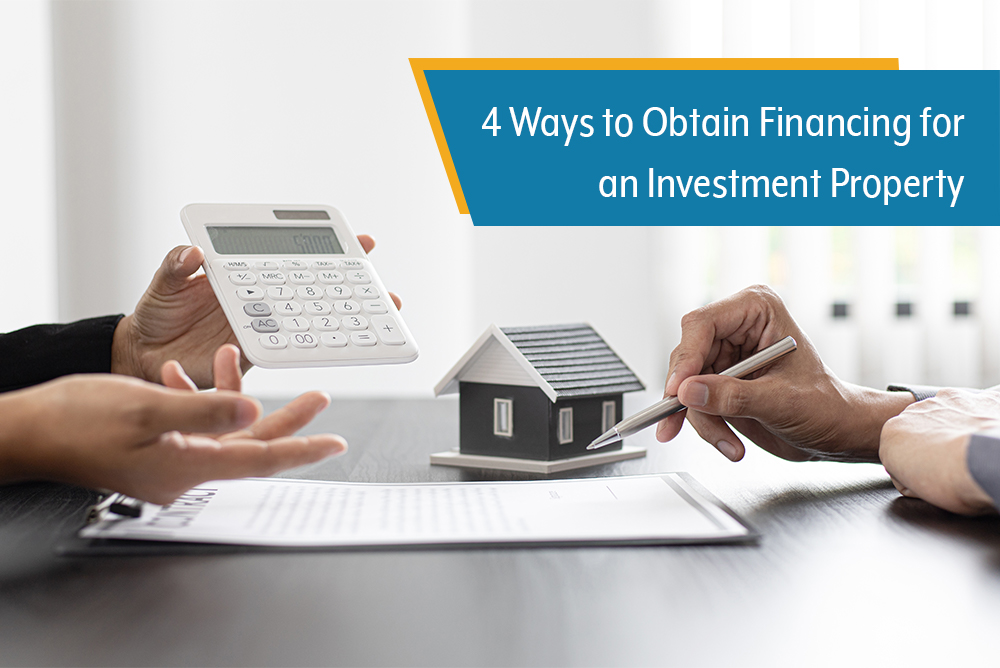
4 Ways to Obtain Financing for an Investment Property
Tags:
Without a question, purchasing an investment property is an excellent way to build wealth while also diversifying your portfolio.
After doing your research and deciding that investing in real estate is the right choice for you, you’ll need to consider how you will go about obtaining financing for your exciting new investment property.
While there are four main ways that homeowners can secure financing for an investment property, we will be placing more of a focus on financing via leveraging home equity in this article.
The four common options for financing an investment property are as follows:
Option 1: Conventional Financing via Bank Loan
You’re likely already familiar with conventional financing if you own a home as your primary place of residence. With this financing option, the down payment expectation will generally be 20% of the property’s purchase price. Among other factors, the purchaser’s credit score and credit history will play a role in determining whether they are eligible for the loan, in addition to determining the kind of interest rates that will be reflected in the mortgage.
Option 2: Financing via Hard Money Loan
A hard money loan is a short-term loan option for commercial or investment properties. This non-comforming loan does not come from traditional mortgage lenders, but rather private parties that are willing to accept either property or another asset as collateral. Although the interest rates on hard money loans are often considerably higher than other loan types, they do come with a generally less strict approval process and can be secured fairly quickly compared to other loan options.
Option 3: Financing via Private Money Loan
A private money loan is a loan granted by one individual to another. This type of loan is generally secured by a kind of legal contract that enables the lender to foreclose on the borrower’s property if they are unable to make necessary payments. When it comes to loan terms and interest rates of private money loans, these can vary quite dramatically.
If a private money loan involves a friend or family member to the investor, as it often does, it’s important for the borrower to carefully consider how their relationship with their lender may be affected if anything happens to go awry.
Option 4: Financing via Home Equity Leveraging
Finally, leveraging your home equity can be an excellent option for financing an investment property. You can do this through securing a home equity loan, a home equity line of credit (HELOC), or a cash-out refinance.
As you make payments toward your mortgage, thus decreasing the balance of your loan, you are simultaneously building equity. Home equity loans are a type of second mortgage that enable homeowners to acquire loan proceeds all at once. On the other hand, a HELOC enables a borrower to tap into their equity on an as-needed basis. Finally, a cash-out refinance would include a fixed rate, however it may lengthen the duration of your existing mortgage.
Using a Home Equity Loan or HELOC To Finance An Investment Property
Home equity loans and HELOCs are very similar in nature, however borrowers should be aware of their defining differences in order to make the right choice between the two.
If you plan on purchasing a sole property for investment purposes and require a precise dollar amount to cover the purchase, repairs and renovations, then a home equity loan makes for an ideal choice. On the other hand, if you intend on buying and selling more than one property in a short period of time, then a HELOC is the better choice as it will provide you with a rotating access to funds as you continuously take from and pay down your line of credit with each buy and sale, vs. withdrawing and paying off multiple loans.
When it comes to purchasing an investment property using the equity you’ve already built up in your home, the process will generally go as follows. Firstly, you’ll apply for either a home equity loan or HELOC with a trusted lender. Then, you’ll receive the loan or line of credit after you’ve closed on your property. You can then use this capital to fund your investment property’s down payment (or in some cases, pay the entire purchase price).
Before applying for a home equity loan or HELOC, you will need to first ensure that you’ll be able to make the necessary payments in order to avoid risk of property foreclosure. You should also be aware that a loan will require closing costs.
Benefits of Using Home Equity to Purchase An Investment Property
A home equity loan can help to make purchasing a second property less expensive while providing the buyer with more liquidity. When it comes to using home equity to buy an investment property, in particular, there are several distinctive advantages.
These advantages include the ability to increase the down payment you put toward your new investment property, as home equity loans are provided as a lump sum. With this greater down payment, you can also potentially reduce your monthly payments as well as interest rates. Home equity loans come with fixed and lower interest rates due to the fact that the property is secured as collateral.
Thinking about finally purchasing an investment property?
If you’re considering buying an investment property in Ontario, we’d be happy to lend a hand. Canadalend.com is here to help make it as easy as possible to unlock the equity in your home, so you can turn your dream of acquiring an investment property into a reality.
To learn more about our financing options, or to begin your application for financing a second property, call Canadalend.com at 1-866-I CAN LEND or contact us here.